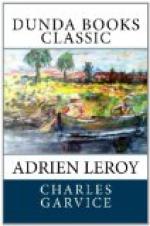“One thing is certain,” said Lord Standon to Lady Constance, who had been sighing over the defeat. “Adrien will not allow any one to ride the ‘King’ again but himself. I heard him say so.”
“He has lost heavily, I’m afraid,” the girl said in a low voice.
“Immensely,” replied Lord Standon, who himself had, lost more than he could afford—indeed, there was little doubt that this race would almost prove his ruin; but, nevertheless, his inordinate good humour and optimistic nature triumphed above every other consideration. Certainly, no word of blame or self-pity would he allow to pass his lips. “Yes, he has lost more heavily than any of us, as Mr. Vermont knows; I’ll be bound,” he broke off, as that gentleman approached.
Jasper Vermont smiled, as he did at every question or assertion made to him.
“I’m afraid he has plunged deeply this time,” was his smooth reply. “Unfortunately, he only has himself to blame, though I deplore the fact that I was not with him at the time.”
Both Lady Constance and Lord Standon looked up, startled by his tone as much as by his words; and Jasper continued glibly:
“He gave the jockey a ten-pound note last night, and, of course, the man got drunk. Consequences—an unsteady hand this morning, a hasty push at the last rise, and a clear loss of the race, not to mention the colossal sum in bets. All his own fault! If he will be so recklessly generous, what is to be done? But, as I said before, I blame myself for not watching him more closely.”
“No one blames you, Mr. Vermont,” said Lord Standon coldly, for even he, the least suspicious of men, seemed to detect the false sorrow in the speaker’s voice.
Lady Constance looked at him gratefully; and Lord Standon was encouraged thereby to proceed:
“Adrien is generous to a fault; and if in this case it has had disastrous results, it is usually a fault which few imitate.”
Jasper raised his eyebrows; then, with a low bow to Lady Constance, and a gentle, deprecatory shrug of his shoulders, walked away.
The girl waited till he was out of earshot, then turned impulsively to Lord Standon.
“I hate that man,” she said in a low voice; “and sometimes I believe he hates Adrien too.”
“So do I,” returned Lord Standon, looking with intense admiration into her lovely, troubled face.
“Do you?” she murmured. “Oh, if you would only try to open my cousin’s eyes to his friend’s falseness—I know he’s false, but Adrien is so blind.”
It seemed as if he were blind in more than one direction; for at that minute Leroy himself crossed the room, with an aspect that, in any other man, would have been termed glum. The sight of the girl with whom he was so rapidly falling in love, sitting in rapt conversation with Lord Standon—even though that young man was his friend—had roused a strong feeling of resentment within his heart. He restrained himself, however, though it was in a rather cold, forced voice that he asked Lady Constance if she would sing. She rose demurely enough; for his very coldness and jealousy, slight as it was—careless as she knew it to be—proved to her that the love she so ardently desired was awakening at last.




